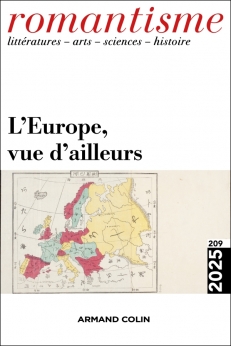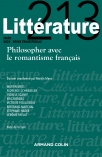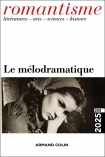
ROMANTISME N°209 (3/2025)
Pour acheter ce numéro, contactez-nous
Recevez les numéros de l'année en cours et accédez à l'intégralité des articles en ligne.
La notion d’Europe (Yôroppa) s’est fixée au Japon au début du XVIIIe siècle, au croisement du travail cartographique des Jésuites et de la rencontre entre un lettré confucéen et un prêtre italien. Elle a pris une dimension importante au début de l’ère Meiji, après l’agression occidentale, sous la plume d’intellectuels voyageurs et encyclopédistes. Fukuzawa Yukichi (1835-1901) décrit dans Tous les pays du monde (Sekai kunizukushi, 1869) une Europe qu’il situe au coeur de la marche de la civilisation, où l’étude et le savoir sont privilégiés. Kume Kunitake (1839-1931) dans son compte rendu du périple de la mission Iwakura (1871-1873) intitulé Rapport véridique sur le voyage d’observation à travers l’Amérique et l’Europe (Beiô kairan jikki, 1878) approfondit l’analyse et réfléchit aux racines du nationalisme, aux fondements politiques de la civilisation et au rôle du commerce international.
The notion of Europe ( Yôroppa) was established in Japan at the beginning of the 18th century thanks to a combination of Jesuit cartography and a meeting between a Confucian scholar and an Italian priest. It gained in significance at the start of the Meiji era, in the wake of Western aggression, in the writings of travelling intellectuals and encyclopaedists. In All the Countries of the World ( Sekai kunizukushi, 1869), Fukuzawa Yukichi (1835-1901) described Europe as an area central to the march of civilisation, where study and knowledge had pride of place. Kume Kunitake (1839-1931), in his report on the journey undertaken by the Iwakura Mission (1871-1873) entitled A true account of the journey of observation through America and Europe (Beiô kairan jikki, 1878) further examines and reflects upon the roots of nationalism, the political foundations of civilisation and the role of international trade.

